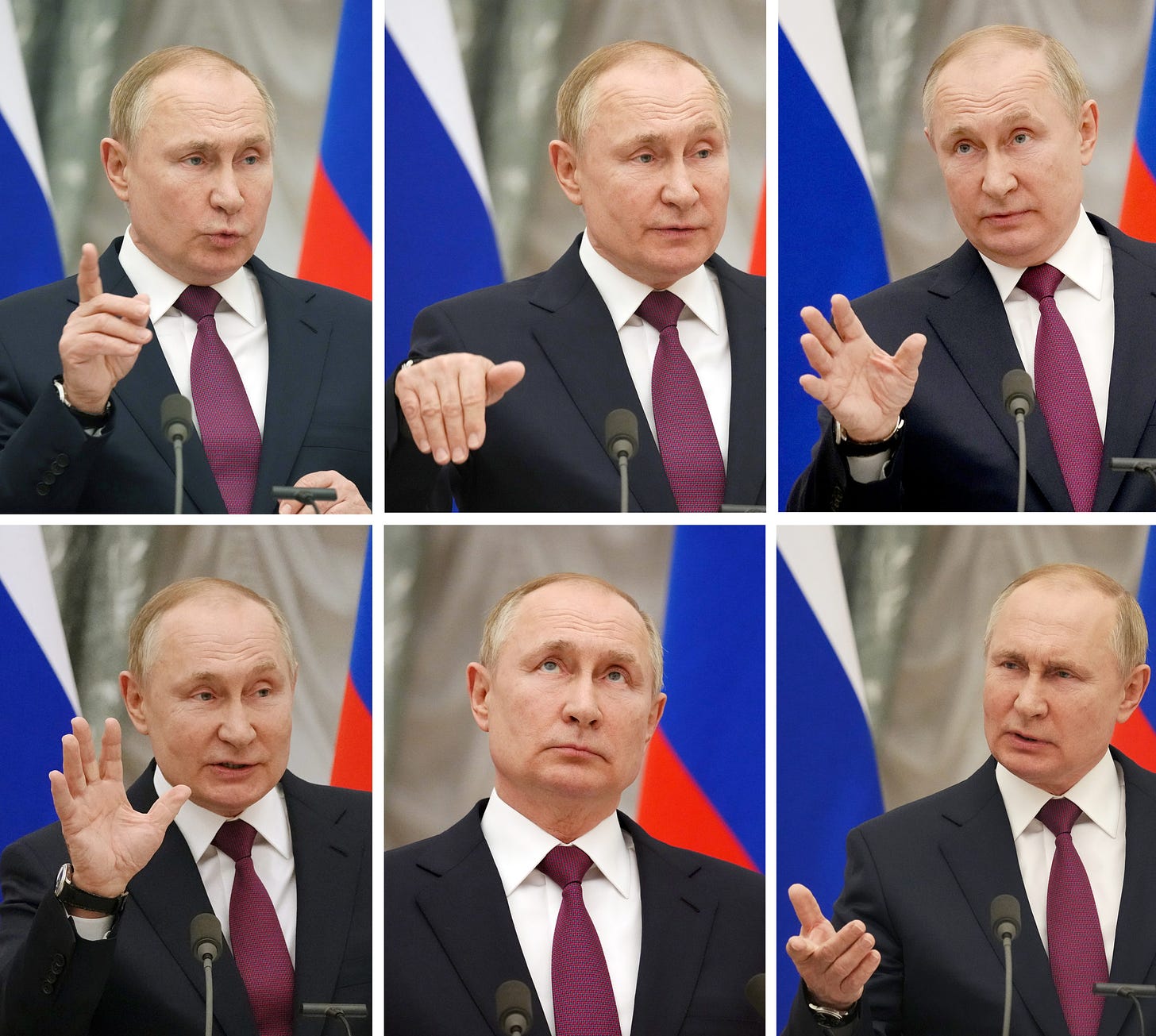
War in Europe seems likely. If one looks beyond all the diversionary propaganda about NATO expansion, it’s clear Vladimir Putin generated another confrontation with Ukraine for this reason: He finds a united Ukraine with a pro-Western, anti-Putin government unacceptable.
Putin has two solutions to the problem of a neighbor, once part of the Soviet Union, that now has a pro-Western democratically elected government. He could remove that government. Or he could massively weaken the nation it governs, most obviously through the loss of substantial territory. He’d presumably prefer both. (What he’d ultimately prefer of course is the reincorporation of Ukraine in Russia—but that would only follow the achievement of the first two objectives.)
Since the West seems unwilling to negotiate the collapse of the Ukrainian government or the further partition of Ukraine, Putin will probably judge he can’t achieve either of his core goals without the use of military force, perhaps very considerable military force.
So Putin seems likely to invade. I sincerely hope he can even at this late date be deterred. But I’m doubtful.
But if war comes, we need to be clear on one thing above all: It will be Putin’s war. There is no “need” for Russia and Ukraine to be at war. They could have tense relations, disputes, occasional border skirmishes even. But the choice for war will be Putin’s. And it won’t be driven by Russian public opinion, by elements of the Russian elite, by NATO expansion, or by geostrategic inevitability. It will be Putin’s war.
One thing we know about international relations is that dictators matter. Dictators who feel threatened by democratic neighbors, who want to justify their rule in part by foreign conquest, who sense weakness—it is they who launch wars, unless deterred.
And our ability to deter is not what it could be. In his two decades in power, Putin has gotten away with an awful lot. Georgia in 2008, Ukraine in 2014, Syria in 2013 and then 2015, election interference in the United States in 2016. To say nothing of crushing democracy at home and poisoning dissidents abroad, and intimidating and bribing other governments and national elites into tolerating his behavior.
So is Putin likely to be intimidated this time? It may be that this time we and our allies are more serious, more resolute, more determined. But will Putin think so? Yes, he’ll figure, there could be serious sanctions at first. But six months from now won’t there be pressure to resume economic relations and adjust to the new status quo? Yes, he’ll know, we’ll send some troops to frontline NATO states. But how long before the voices of America First and Give Peace a Chance get louder, not just here in the United States, but in Germany and France? The Biden administration has done reasonably well in recent months in handling this crisis and signaling firmness. But what does Putin think when the American president feels he has to preface even relatively tough statements with reassurances that no U.S. troops will ever set foot on Ukrainian soil? Or even, presumably, fly above such soil to enforce, say, a no-fly-zone?
Putin stared down President Bush in Georgia in 2008. He helped usher President Obama from his Syria red line in 2013 and then invaded Ukraine in 2014. He helped President Trump get elected and then watched Trump side with him at Helsinki in 2018. Does Putin think Biden is that much stronger than his predecessors? I fear not.
But what if Putin does launch a war?
Once a war starts, all bets are off. In 1990, Saddam Hussein assumed George H.W. Bush was too preoccupied with Europe to help a small nation with which the United States had no treaty obligations. Slobodan Milosevic, having gotten away with so much, assumed Bill Clinton wouldn’t fight . . . until we did, in 1995 and then again in 1999. Osama bin Laden assumed the United States under George W. Bush wasn’t up to a multi-year fight to destroy al Qaeda, and his soulmates in ISIS thought Barack Obama wouldn’t respond to their atrocities in 2015.
So it will be with Putin and Ukraine: The day after the war begins, everything changes. President Biden will be stronger at home, not weaker. It’s true that twenty years of the United States failing to stand up to Putin have left Biden with a weak hand. On the other hand, the United States plus NATO is not nothing. And Russia isn’t, as we used to say during the Cold War, ten feet tall.
But let’s not forget, the issue isn’t Russia. The issue isn’t Ukraine. The issue isn’t NATO. There will be no geopolitical necessity underlying this war, if it happens. It will be a war of aggression launched by a dictator. It will be Putin’s war. We need to do our best to make sure it is not Putin’s victory.










